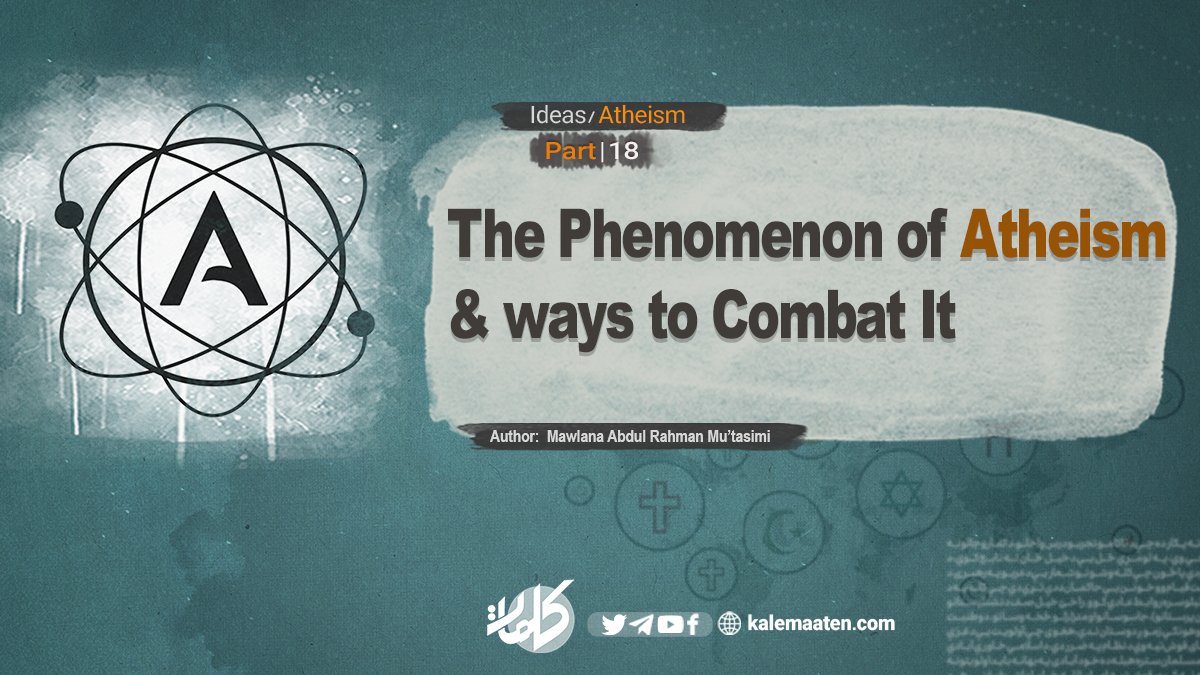
Author: Mawlana Abdul Rahman Mu'tasimi
The Phenomenon of Atheism and Ways to Combat It (Part 18)
Atheism, to the extent that it has spread and proliferated in the West and non-Islamic countries, has not significantly penetrated or expanded in Islamic countries, despite extensive efforts to promote it. This reality has compelled Orientalists, thinkers, and Western historians to reflect on the reasons behind the slow spread of atheism in Islamic societies.
On platforms like Wikipedia, three fundamental factors, as cited by Orientalists, thinkers, and Western historians, are often highlighted. It is worth briefly examining these factors and, where necessary, providing analysis and commentary.
The idea of atheism, during its initial spread in the European colonial era, encountered significant resistance in several Islamic countries. Most Orientalists and historians agree that the following reasons have played a crucial role in hindering the genuine spread of atheistic thought in the Islamic world to this day.
1. Limited Scientific Advancement and Education: The shortage of scientists and the relatively low level of education in the Arab world and, more broadly, in Islamic societies, are often cited as reasons for the limited success of atheistic and secular thought in these regions.
2. Collectivist vs. Individualist Societies: The nature of Eastern societies, which are predominantly collectivist, contrasts sharply with European societies, where individualism prevails. In collectivist societies, individuals are deeply tied to their communities, and decisions must consider the interests of the group before personal interests. As a result, while a Western individual may declare atheism as a personal choice, an Eastern individual who does so risks isolation from their closest relatives.
3. Islamic Modernization Movements: The emergence of Islamic modernization movements has also played a significant role. Leaders such as Jamal al-Din Afghani (1838–1887), Muhammad Abduh (1849–1905) of Egypt, and Muhammad Iqbal (1877–1938) of India sought to revive the Islamic spirit among Muslims after centuries of perceived decline. These movements have acted as a counterforce to atheistic and secular ideologies.
Regarding the first factor—the perceived weak level of education in the Islamic world—it is important to clarify that this argument implies that Western-style education, which is secular and often critical of religion, leads to atheism. However, this assumption overlooks the fact that Islam itself encourages knowledge and learning. Islam is not compatible with ignorance or superstition. The religion emphasizes reading, values knowledge as a divine blessing, and holds scholars in high regard. The Quran repeatedly encourages contemplation, reasoning, and reflection. Therefore, it is incorrect to assume that the survival of Islam depends on ignorance or illiteracy. On the contrary, the expansion of knowledge and education does not diminish the scope of Islam; rather, it strengthens it.
In addition to these three factors, two other elements can be considered strong barriers against the spread of atheism in Islamic societies:
1. The Nature of Islam: Unlike Christianity, which has undergone significant distortions and the introduction of superstitions, Islam has not historically opposed science or persecuted scholars. It has not committed atrocities in the name of religion, as seen in certain periods of European history. This distinction has made Islam more resilient to atheistic critiques.
2. Religious Education and Reform: Religious education in mosques and schools, along with the efforts of preachers and reformers, has served as a robust barrier against the waves of atheism. These institutions and figures have played a key role in preserving religious identity and countering secular ideologies.
Based on the above, it is evident that the spread of atheism in the Islamic world faces significant obstacles, and atheists have not succeeded in implementing their secularization programs as they had hoped. At the same time, it cannot be denied that there are individuals in Islamic societies who hold atheistic views, though they often conceal their beliefs out of fear. Many operate under pseudonyms on social media platforms to express their dissent.
Moreover, there is a notable presence of intellectuals who, while claiming affiliation with Islam and adhering to religious practices, harbor atheistic tendencies. In areas such as politics, economics, women’s rights, and Islamic penal laws, they express doubts and find themselves in intellectual dilemmas. They often argue that strict adherence to traditional Islamic principles is unnecessary in the modern age. Therefore, it is essential to briefly examine the factors and causes of atheism in the Islamic world.
Continues…



